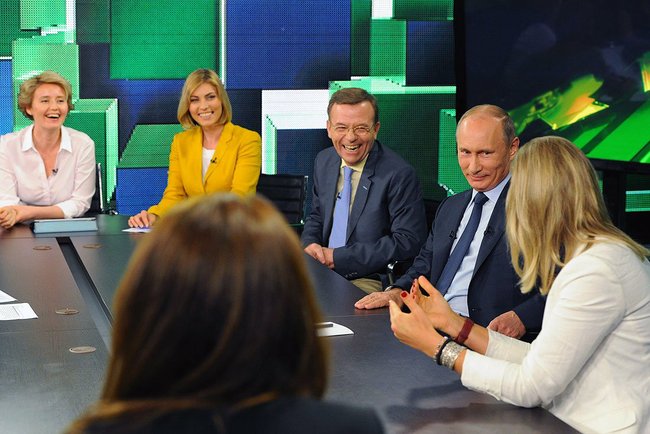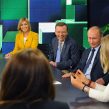
Putin Believes US-Russian Relations Are Dominated by Zero-Sum Game
Publication: Eurasia Daily Monitor Volume: 10 Issue: 112
By:

June 12 is Russia Day, a national holiday traditionally celebrated by awarding Russia’s annual State Prizes in the fields of science, technology, the arts and literature, followed by a lavish reception in the Kremlin. This Wednesday, President Vladimir Putin awarded the State Prize to Sergei Nikulin, the general director of the Moscow Institute of Teplotekhnika Corporation and the main designer of modern Russian intercontinental ballistic missiles (ICBM). Nikulin, together with two of his co-workers, received this year’s State Prize for the design of the new land-mobile RS-24 Yars ICBM, which features multiple individually guided warheads, specifically earmarked to thwart the United States’ future ballistic missile defense plans. Accepting the prize, Nikulin announced: “Who comes to us with a sword, will die from the sword. If not we, who else could execute the orders of President Putin to strengthen our country? We will build such a high potential, so anyone, who may just dream of attacking our sovereign country, will always know payback.” Putin replied: “If not we, who else? I will rephrase: If not we [destroy them], then [the enemies will destroy] us [Esly ne my, to nas].” Putin added that Russia cannot hope “to work in peace,” because competition in the world is growing in all fields. “This is not an aggressive statement—this is the truth of life,” he concluded (https://news.kremlin.ru/transcripts/18323/).
Russia is developing and deploying its newest nuclear-tipped ICBMs like the Yars against the US, seen by the Kremlin as an eternal enemy. This week, Putin visited the newly built and lavishly equipped headquarters of Russia’s main foreign propaganda outfit—TV channel Russia Today (RT), which broadcasts in English, Spanish and Arabic. Speaking to RT journalists, Putin accused the US of becoming an imperialist power after the end of the Cold War and the demise of the Soviet Union in 1991, which is now bent on dominating the world and using a nonexistent Iranian nuclear threat to discipline other Western nations into submission. Putin accused US diplomats of abusing their status by aiding pro-democracy activists in Russia. The Russian president also asserted that Iran is fully complying with International Atomic Energy Agency (IAEA) rules and that there is no proof of any Iranian nuclear mischief. While expressing hope Iran may curtail its anti-Israeli and anti-American rhetoric, Putin assured that Russia is eager to continue and develop its cooperation with the “great Iranian nation” (https://news.kremlin.ru/news/18319/).
Pooling together traditional Soviet-time propaganda clichés, Putin recalled the US “genocide” of Native Americans, slavery and racial segregation that is still, according to Putin, very much evident in the United States today. Putin deplored the US nuclear bombing of Japanese cities in 1945 and expressed doubt that Soviet dictator Josef Stalin would have dropped an atom bomb on Nazi Germany if the USSR obtained nuclear weapons in 1945, when an overall victory was already assured. After expressing his “personal opinion” that Americans and their leaders are worse than Stalin, Putin acknowledged that the US is basically a democratic country, built on the principle of individual rights and freedoms, whereas Russian society is built on “collectivism,” which makes it fundamentally different. The Russian national soul, according to Putin, is eternal and directly connected to God, unlike, apparently, the pragmatic American one—“so it is very hard for us to understand each other, but it is possible sometimes” (https://news.kremlin.ru/news/18319/).
Putin clearly believes a zero-sum game dominates US-Russian relations: If we do not get to them, then they will get to us. Differences with the US are not ideological per se, but fundamental, based on national history and the illusive “national soul,” making them practically irreconcilable. Sometimes cooperation is possible, but the US is still the eternal enemy and nuclear ICBMs must be constantly modernized, armed and aimed at the US, “or they get us” with nuclear weapons like the Japanese in 1945 or worse. According to Putin, Washington’s international, imperialistic, aggressive plans aimed at Iran and Syria must be resisted.
Putin repeats the staple Soviet propaganda cliché about ugly American individualism as opposed to the altruistic Russian “collectivism.” In fact, Russians help others or offer aid less than Westerners: 35 percent of Russians say they helped a stranger last month, while for countries of the Organization for Economic Cooperation and Development (OECD), the average is 47 percent (Interfax, May 23, 2012). Some 50 percent of Russians approved legislation forbidding the adoption of Russian children by Americans, enacted last December, but only 4 percent are ready to adopt a Russian orphan themselves; 16 percent say “maybe in the future”; and 75 percent say they are not ready to adopt an orphan ever (Kommersant, January 31).
Recent polls show Russians as socially atomized, year after year trusting less and less anyone outside the circle of their closest of kin. In 2012, according to Levada-Center polls, only 5 percent of Russians said they trust other people. Lack of social trust covers all social groups irrespective of income or status, since all Russians are powerless to influence the repressive policies of the authoritarian state Putin has built (Vedomosti, February 7).
On June 12, Putin also attended the inaugural congress of the Peoples Front for Russia— previously, the All-Russia Peoples Front or ONF (Obtserossysky Narodni Front)—an informal shell organization of Putin’s supporters constructed in May 2011 to help run Duma and presidential elections in 2011 and 2012. Now the ONF will officially register as a political movement with strictly individual membership, as previously it allowed collective membership by parties, trade unions or state-run corporations like the Russian Railroads. A visibly happy Putin was affirmed ONF leader by acclaim at the congress and declared that the ONF will unite “all Russians” that want good for the country, reaching over party lines as well as ideological and social divides to promote “new people’s ideas” and “new people” to be elected to government. The congress crowd replied by chanting: “ONF! Russia! Putin! The People!” Commentators in Moscow believe that sometime in the future, when the Duma must be reelected in 2016 or Putin may run for another 6-year presidential term 2018, the ONF may replace the discredited United Russia ruling party as Putin’s main powerbase (Kommersant, June 13). Apparently that is how Putin understands the presumed Russian “collectivism” as opposed to US “individualism”—all Russians, irrespective of age, social status, ideology, party, religion or ethnicity, without question or dissent, collectively kowtowing to his whims.




